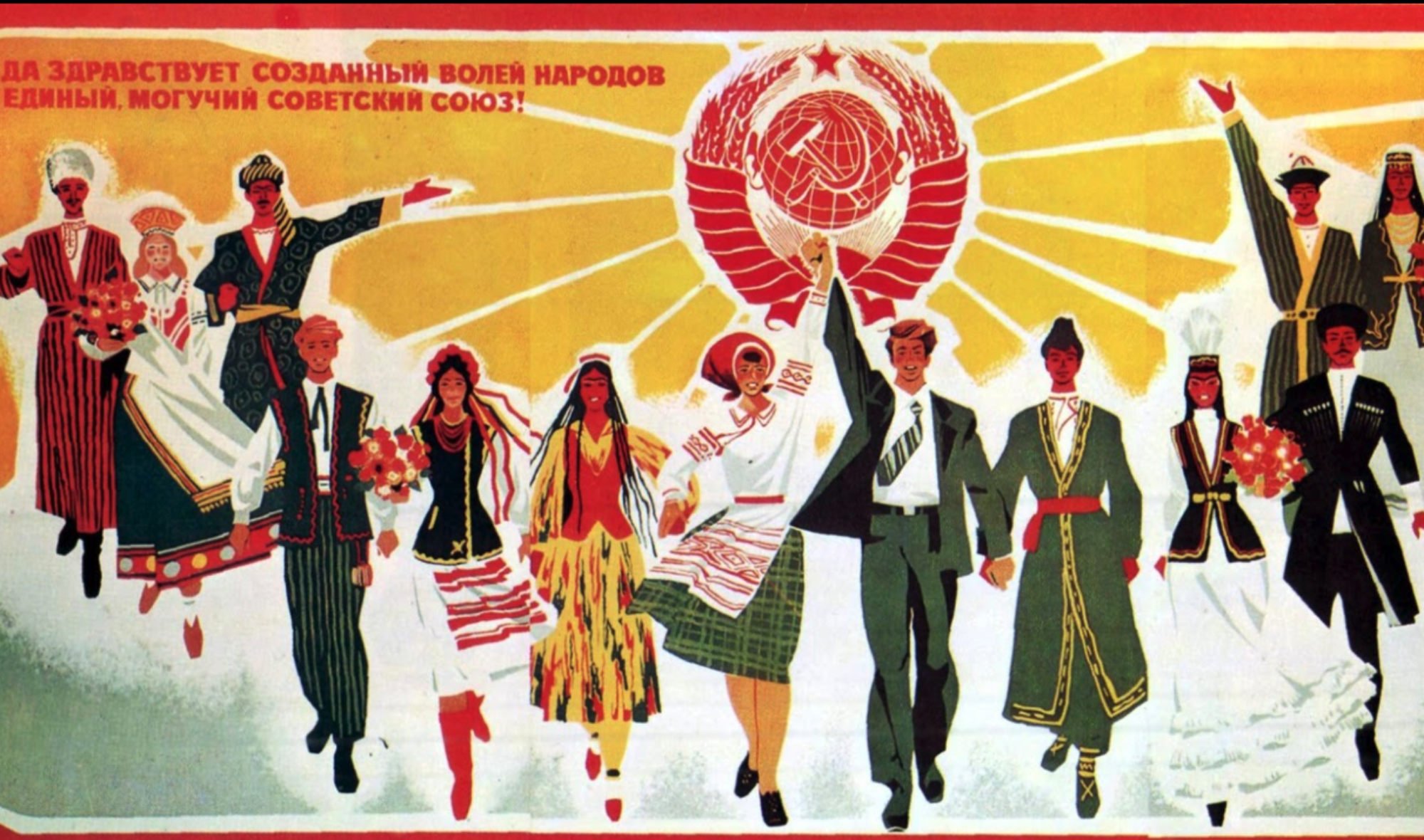In “Stalin’s Forgotten Zion”, there is quite a bit of discussion about the Russification of Jewish people in the J.A.R. By the late stages of the Soviet Union, there were barely any bits of Judaism left: no schools taught Yiddish, there were no celebrations of festivals or holidays, and even the way they dressed had been Russified. It was nearly a complete loss of culture. While it was not abnormal for the Soviet Union to be so against religion, the Jewish population was treated especially poorly by the government by forcing them into one area and dismantling their culture. Do you think that this erasure of Jewish culture was because the Soviet Union was so anti-religion? Or, do you think it could have been because of the historical anti-semitism seen throughout Europe since the early ages?
Discriminatory Nationalism
In chapter 8 of A Biography of No Place, Radical Hierarchies, Brown discusses the result of the German authorities entering the borderlands. She outlines Professor Karl Stumpp’s illustration of German peoples in the borderlands. He is pretty upset seeing how the German people are living. He states, “‘If they didn’t want to perish, they had to knuckle under and swallow the insults or go to cities and blend in, obscuring the traces of their former existence so as not to appear as German'” (Brown, 194). Thus an interesting and maddening dichotomy arises, where there are two governments doing deplorable actions against different groups of people based on ethnicity, religion, etc.- yet, Stumpp can still be disgusted by the treatment of fellow Germans in a different “nation”. Furthermore, Brown discusses how Stumpp ignores the other nationalities facing these conflicts in the USSR, and only focuses on the atrocities against Germans. Thus, it makes me wonder how both of these “nations” can exist at the same time whilst condemning the other? Moreover, Brown describes the process in which the German authorities organized the German Soviets, in a way that focuses on physical appearance and a strange
A Biography of No Place Chapter 6
Chapter 6 was an Interesting subject to read, but also very disturbing when reading it. I found this chapter extremely interesting cause, when studying WWII or Pre War Soviet Union very few academic books mention the Great Purge. What makes this topic so unique is, why did the Soviet Union perform Genocide to Oppress their people? This section gives a clear cut explanation of who the regime went after (Leon Trotsky, Trotskyist, Wealthy Peasants, and even counter revolution minorities and Nationalities). I love in this chapter how Kate Brown went into depth on how the Soviet Union went through records, geography of National Identified groups, and also of why these revolutionist in their eyes “to be dealt with”. (To conclude, I ponder as to why this subject of the Great Purge was never discussed in textbooks? The Nazi party conducted Genocide during the same era both were conducted for different reasons one over religion and one over political views). Lastly, did the Soviet Union see this Great Purge as the best option and was this the right move for them to make in order to succeed in the future?
The Great Purges
The causes for arrests The Great Purges from 1937-39 seem to go from targeting political resistance to persecuting minorities deemed as threatening to the state. Brown describes the ‘album’ method in which the NKVD searched through “records from schools, collective farms, party cells, labor unions and military service,” which identified people by their nationality, in order to find suitable candidates for arrest. (Brown, 158). Brown later explains how the USSR weakened its ideological base by the massive arrests under false pretense (Brown, 167). However, the USSR was able to accomplish its goals of consolidation power and creating fixed national identities. My question is did the USSR hurt itself more than it benefited from the oppression of national minorities and what Brown says Stalin called ‘spy mania,’ or did the purges help the USSR more in the long run?
From Balytskyi to Leplevskyi
When reading the beginning of chapter 6 in “A Biography of No Place” by Kate Brown, the author talks about the change in power for the NKVD Chief position going from Balytskyi to Israel Leplevskyi. In this exchange, Brown mentions that Leplevskyi was exiled after spreading rumors that his boss’s success was due to his efforts (Brown, 156). Leplevskyi swore that he would return and did only to accuse Balytskyi and his bureau of inactivity in fighting the enemy. Leplevskyi went on to replace Balytskyi and conduct major efforts in the Great Purges from 1937 to 1939 (Brown, 158). This includes arresting just about anybody with a Polish connection, to which Leplevskyi had never questioned. He soon after asked to be able to arrest more people, knowing he couldn’t satisfy such a ludicrous request. my question is whether or not things would have been off if Pelevskyi had never replaced Balytskyi? Was the diligent tenor of terror better than that of a complacent man like Balytskyi?
Racial Hierarchies
As I was reading through Chapter 8, the creation of the racial hierarchies within Germany’s newly conquered lands made me think about Soviet efforts in the same place. We have talked the last few classes about the Soviet Union’s struggle to organize people in the borderlands (and throughout the Soviet Union) based on nationality. When the Germans take control, it seems as though they are doing something similar, but on a much more complex level. Although the Germans face some challenges, they seem to be much more organized with the way they undertake this huge project. I do not want to say they are successful in achieving their goals, but it seems they get closer than the Soviet government. Is this because the Soviet’s are strictly looking at things from a primarily economic view? Obviously the Germans are more concerned about actually separating (or eliminating) certain groups. Hope this post makes some sort of sense.
The Great Purges and Power Vacuums
The purges were a horrible period in the Soviet Union, which caused the deaths and exiling of thousands of people who were more than likely to be innocent of any “crime against the state” or espionage. However, many people were able to take advantage of this situation as well. A prime example would be Leplevsky, who spread rumors and half-truths about Balytyski that eventually got him exiled and killed. When Leplevsky came into power at the NKVD, he arrested all of Balytyskis leading deputies and replaced them with young workers who would follow him blindly (pg 157). Under his power, almost 20,000 people were arrested in connection to a “polish conspiracy”. Some of these people included top party leaders who had otherwise good names among the people.
Given what we know about the purges and how they worked, do you think that it was inevitable that people like Leplevsky would come into power and abuse the state of the Union?
From Bad to Worse: Stalinist Policy in the Kresy to 1935
Reading through chapters 3-5 of “A Bureaucracy of No Place”, it quickly becomes clear to the reader that the Soviet bureaucracy’s handling of the Kresy zone was wildly inconsistent and seemed to have only made things worse with every measure it took. Economically, the issues started with the New Economic Plan, where (among other issues) peasants found that they were having an immense amount of difficulty producing enough crops to support themselves. The economic issues were further compounded by the Soviet crash implementation of mass collectivization, which produced an immense amount of pressure on the peasants. Conditions got so bad that this region eventually went into a state of open revolt against the Soviet government. The fallout from this debacle earned the Soviet authorities the resentment of many of the border peoples, which they responded to initially by imprisoning many suspected “nationalists” and “foreign agents” before settling on the mass deportation of ethnic Poles and Germans to other parts of the Soviet Union.
What really struck me while reading this section of the book was simply how inconsistent and uncoordinated the Soviet administration was during this episode. This can be seen in instances such as the logistical difficulties Zborovskii faced while overseeing the deportations, which were the result of poor upper level communication and administration. One other particularly bizarre example was a section of the main Soviet Presidium declaring the scattered Polish cultural measures a rousing success and ordering more teachers into the Kresy. The situation became even stranger when 40% of those teachers were arrested by the Ukrainian NKVD on charges of “nationalist activity”.
All in all, this whole affair was a debacle for the Soviet government, and is an accurate reflection of the atmosphere of paranoia and inconsistency that dominated Soviet thinking during this time.
Agriculture, Collectivization, and the Great Leap
The Soviet administration inherited one of the most defunct political systems in Europe. Historically the areas that constituted the USSR were mostly poor and unindustrialized except some metropolitan areas and just emerged from war and pestilence while still suffering widespread famine. The public administration overhaul required was obnoxiously large and the Soviets leadership made substantial adjustment but the implementation of these policies was barbaric and coercive. The necessity of vast agricultural reform was apparent to Soviet leadership, the proletariat was starving and the infrastructure required to feed them did not exist, not to mention the rampant poverty in the border lands
“No matter how hard I work, I can’t better myself”
. The odious apparatus the Union used to fix this was collectivized farming which created more problems than it solved. The absolute brutality the Soviets inflicted on Kulaks in the name of efficiency highlighted the key problem about conceptualization to actually enacting policy that the Soviets struggled with.
Village Reactions to Deportation
It is clear in chapters 3-5 in Biography of No Place that deportation was a chaotic and poorly planned event. Not enough resources were given to the villagers who were moving, nor were enough resources given to the people moving them so that they could have a safe journey. In fact, in the chapter “A Diary of Deportation”, Zborovskii mentions that there were not enough wagons to carry the elderly and the children to the resettlement areas. Some placed did not even have enough paper for him to write on. However, this did not seem to affect some of the villager’s outlooks on deportation. In fact, some villagers were happy to be sent to these new areas.
“18 February 1935: In the [German] village of Negeim I called a meeting of the Young Communist League at 10:00 a.m. to get their participation in the campaign. They broke into four brigades. We informed the families concerned…about90% were happy to be going. For instance, Gustav Ryk said, “I am happy about the resettlement. It will be a lot better in the new place. They have good black earth there.”
Some villages, though, were upset or confused about why they were being deported. One townsperson said it was because they were trying to get rid of Polish and German residents. Others believed it to be a punishment for refusing to do collective farming. Why do you think that some villages were happy to move, while others weren’t? What could have convinced them that this was a good move?

